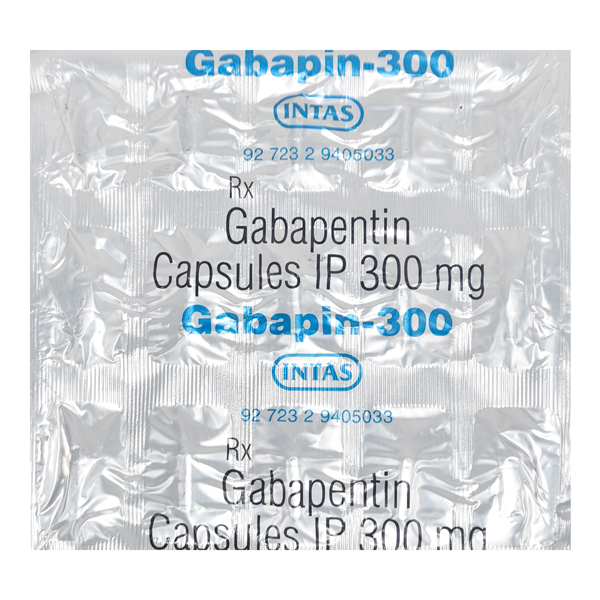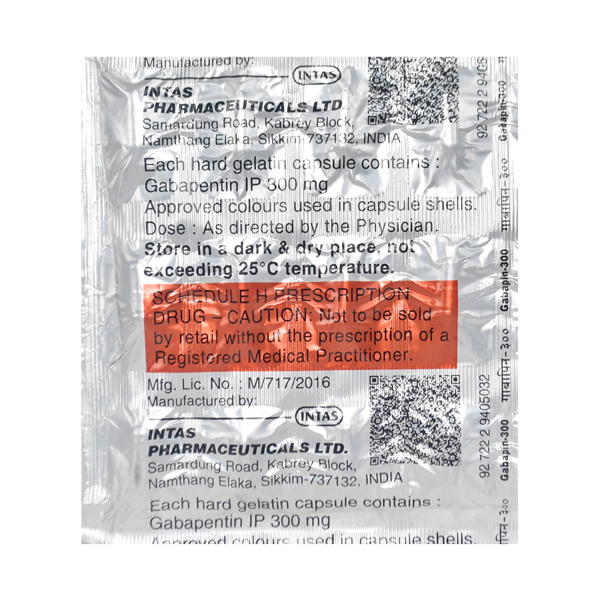Gabapin 300mg Capsule 15'S
GABAPENTIN 300MG
₹ 376.00
₹419
(Inclusive of all taxes)
-

No Warranty
-

COD Avilable
-

Non Returnable
-

cancelable
About this item
INTRODUCTION ABOUT GABAPIN 300MG CAPSULE
Gabapin 300mg Capsule, containing Gabapentin, is widely used to manage nerve pain caused by conditions like diabetes, shingles, spinal cord injuries, etc.. It also helps control seizures in certain patients.
Take Gabapin as advised by your doctor. It can be taken with or without food. Follow the dosing schedule mentioned by your doctor for faster and effective results. Take this medicine at the same time each day for better effectiveness. Do not stop taking Gabapin without talking your doctor, especially if you have taken for chronic period as sudden stopping of gabapentin capsules may cause unpleasant reactions like anxiety, irritability, and trouble sleeping in some individuals.
Before taking Gabapin, inform your doctor if you have any kidney problems, diabetes or if you are pregnant or breastfeeding. Gabapin can be used in children aged 6 years or older under careful doctor supervision. Regularly perform the medical tests recommended by your doctor to analyse the safety and efficacy.
Most common side effects of gabapin tablets are dizziness, drowsiness, sleepiness, tiredness, weight gain. Talk to your doctor if any of these side effects become troublesome or if you experience persistent depression, suicidal thoughts, excessive aggression or any unusual behavior after taking this medicine.
USES OF GABAPIN 300MG CAPSULE
- Relieves nerve pain
- Manages seizures
- Manages diabetic neuropathy
Key Benefits of Gabapin Capsule:
Gabapin in Nerve Pain Management:
Gabapin 300mg Capsules are a trusted solution for managing nerve pain caused by conditions such as diabetic neuropathy, post-herpetic neuralgia, and trigeminal neuralgia. With its active ingredient, Gabapentin, this medication helps in stabilizing the nerve signals, reducing pain, and improving quality of life. Whether you're suffering from sharp, burning sensations or persistent nerve discomfort, Gabapin 300mg offers significant relief and helps prevent the worsening of nerve pain. It’s a safe and effective treatment option when used as part of a comprehensive pain management plan."
Gabapin: Effective Relief for Seizure Disorders
Gabapin 300mg is also highly effective in managing seizure disorders, including focal seizures and generalized seizures. As an anticonvulsant medication, Gabapin works by stabilizing the electrical activity in the brain, reducing the frequency and severity of seizures. For patients with epilepsy, Gabapin 300mg provides much-needed control over seizures, improving daily functioning and reducing the risk of seizure-related injuries. This medication is an essential part of the treatment regimen for seizure management, allowing patients to lead more stable and productive lives.
HOW GABAPIN 300MG CAPSULE WORKS
Gabapin 300mg is a medication that helps manage both epilepsy (seizures) and nerve pain. Here's how it works for each:
1. Gabapin for Epilepsy (Seizures):
Gabapin helps control seizures by calming the overactive electrical signals in the brain. Seizures happen when these signals go out of control, but Gabapin helps to keep them steady, which reduces the chance of seizures. This can help you feel more in control and improve your daily life.
2. Gabapin for Nerve Pain:
Gabapin also helps with nerve pain, which happens when your nerves are damaged. It works by calming the nerves, stopping them from sending pain messages to your brain. This can reduce burning, tingling, or sharp pain, especially in conditions like diabetic neuropathy.
By taking Gabapin 300mg as your doctor prescribes, it can help you manage seizures and nerve pain, allowing you to live more comfortably.
DIRECTIONS FOR USE
Gabapin 300 is a prescription medication which needs to be purchased and consumed only if you have a valid medical prescription.
How to Take Gabapin 300mg Capsule safely:
- Always take Gabapin 300mg exactly as prescribed by your doctor.
- Your doctor will decide the right dose for you based on your condition. Do not take more or less than directed.
- Gabapin 300mg can be taken either with food or on an empty stomach. However, taking it with food can sometimes help reduce any stomach discomfort.
- Take the capsule whole with a glass of water. Do not crush or chew the capsule, as this can affect how the medicine works.
When To Take:
Try to take Gabapin 300mg at the same time each day to help you remember. This will also keep a steady amount of the medicine in your body.
Recommended Dosage of Gabapin 300 for Neuropathic Pain:
For Adults:
- Starting Dose: Your doctor may start you on a lower dose of Gabapin, usually around 300mg per day, taken in one or more doses.
- Increasing Dose: If necessary, the dose may be gradually increased. Most people may take 600mg to 900mg per day, divided into 2 or 3 doses.
For Children aged 6 years or older:
The dose to be given to your child will be decided by your doctor as it is calculated against your child’s weight. It is usually given in 3 separate doses, by taking the capsule(s) each day, usually once in the morning, once in the afternoon and once in the evening. Therefore, consult your doctor’s advice for more dosing related information
Gabapentin 300 mg dosing instructions for Epilepsy:
For Adults:
- Starting Dose: The usual starting dose for epilepsy is 300mg once a day on the first day.
- Dose Increase: After the first day, your doctor may increase the dose. Typically, it’s increased to 300mg taken 2 to 3 times a day.
For Children:
Consult your doctor child’s doctor for advice.
What to Do If You Miss a Dose of Gabapin 300?
If you miss a dose of Gabapin 300mg, take the missed dose as soon as you remember. If it’s nearly time for your next dose, skip the missed dose and take your regular dose as scheduled. Do not double up on doses to make up for a missed one. Taking an extra dose of Gabapin to make up for a missed one can increase the risk of side effects. Stick to your prescribed schedule to avoid any problems.
Stopping Gabapin safely:
- Do not suddenly stop taking Gabapin, especially if you’ve been on it for a long time. Stopping abruptly can lead to withdrawal symptoms like increased seizures, anxiety, irritability, and trouble sleeping.
- If you wish to stop gabapin 300, talk to your doctor. Your doctor will guide you in gradually reducing your dose over time, if stopping Gabapin is necessary. This slow reduction helps your body adjust and reduces the risk of withdrawal symptoms.
- If you experience any new or unusual symptoms after reducing or stopping Gabapin, such as trouble sleeping, nausea, or anxiety, contact your doctor immediately. These may be signs of withdrawal or a return of your original symptoms.
SIDE EFFECTS OF GABAPIN 300MG CAPSULE
Like all medicines, Gabapin may cause certain side effects although not everybody gets them.
Common side effects of Gabapin include:
- Drowsiness
- Dizziness
- Fatigue
- swelling in the hands or feet
- weight gain
- unusual thoughts or behaviors
Gabapin: Serious Side Effects:
If you experience any of the following side effects after taking gabapin 300, consult your doctor immediately
- Severe Allergic Reactions symptoms such as rash, itching, swelling (especially of the face, tongue, or throat), severe dizziness, or trouble breathing
- Mood or Mental Changes symptoms such as depression, anxiety, suicidal thoughts, or unusual changes in behavior
- Chest Pain or Heart Problems symptoms such as severe chest pain, irregular heartbeat
- Difficulty Breathing symptoms such as shortness of breath, slow or shallow breathing
- Severe or Persistent Stomach Problems symptoms such as unexplained stomach pain, nausea, vomiting, or unusual changes in bowel movements
Gabapin 300: Long-Term Use and Safety
Gabapin 300mg can be taken long-term under the supervision of your doctor. It helps manage chronic conditions like neuropathic pain and epilepsy. While it is effective for long-term treatment, it's important to follow your doctor’s instructions carefully to ensure the best results.
1. Regular Doctor Checkups: If you’re using Gabapin for an extended period, regular checkups with your doctor are essential. Your doctor will monitor your health and adjust the dosage if needed. This helps ensure that Gabapin is still working well for you and that you’re not experiencing any unwanted side effects.
3. Safety Considerations: Long-term use of Gabapin can sometimes lead to side effects like dizziness, drowsiness, and swelling. If you notice any new or unusual symptoms, contact your doctor. Periodic screening of kidney functions are crucial while taking this medicine, as it is processed via kidneys
4 How to Stay Safe on Long-Term Gabapin Use: Take Gabapin exactly as prescribed. Keep all follow-up appointments with your doctor. Be aware of any changes in your health and report them to your doctor.
HOW TO MANAGE SIDE EFFECTS
Dizziness Or Drowsiness
To manage dizziness caused by Gabapin 300 Capsule, follow these simple steps:
- Sit or Lie Down: If you feel dizzy, sit down or lie down immediately to reduce falling. Keep your head still and close your eyes if needed.
- Hydrate: Dehydration can cause dizziness, so drink water or electrolyte-replenishing drinks like sports drinks.
- Avoid Sudden Movements: When standing or sitting, do so slowly to avoid triggering dizziness. Take your time when getting up.
- Eat Small, Regular Meals: Low blood sugar can cause dizziness, so eat small meals throughout the day and avoid skipping meals.
- Fresh Air: Sometimes dizziness can be alleviated by taking slow, deep breaths in a well-ventilated area.
- Avoid alcohol consumption as it may increase your dizziness and refrain from performing heavy activities.
WARNING & PRECAUTIONS
PREGNANCY
Consult your doctor- There’s limited information on how Gabapin affects a developing baby. Some clinical studies have shown that gabapentin can pass through the placenta. Although the risks are not fully known, it’s important to use it under close medical supervision.
- Therefore, Gabapin 300mg is probably not safe for use in pregnant women and should only be used during pregnancy if it’s absolutely necessary. If you're pregnant or planning a pregnancy, talk to your doctor about safer treatment options.
BREASTFEEDING
Consult your doctorGabapin 300mg can pass into breast milk, but the effects on a nursing baby are unclear. If you are breastfeeding or planning to breastfeed, consult your doctor to determine whether it’s safe for you and your baby.
DRIVING AND USING MACHINES
Use with CautionDo not drive or operate machines if you experience vision problems, dizziness, drowsiness or tiredness after taking Gabapin 300.
ALCOHOL
Consult your doctorAvoid consumption of alcohol while taking Gabapin capsules, as it can cause excessive drowsiness.
KIDNEY
Use with CautionGabapin 300 capsule should be used with caution in patients with kidney problems. Dosage adjustment and careful monitoring are required in such patients. Therefore, inform your doctor if you have any pre-existing kidney diseases as a precaution.
LIVER
Consult your doctorThere is no proper information regarding the use of this medication in liver patients. Please consult your doctor before taking it.
ALLERGY
ContraindicatedDo not take Gabapin 300 if you are allergic to Gabapentin, and/or any other ingredients of this medicine.
USE IN PEDIATRICS
Consult your doctorStudies have shown that gabapentin 300mg can be used in children aged 6 years or older to manage epilepsy and pain. It is not suitable for use in children aged under 6 years. Consult your child’s doctor for advice before taking this medicine.
USE IN GERIATRICS
Use with CautionGabapin Capsule should be used with caution in elderly patients (aged 65 years or above). Consult and inform your doctor before taking Gabapin Capsule.
OTHERS
Before taking Gabapin 300 Capsule, inform your doctor if you:
- Have acute pancreatitis with signs of persistent stomach pain, feeling sick and being sick)
- Have nervous system disorders, respiratory disorders
- Have muscle pain and/or weakness
- Suffer with different types of seizures including absences
- Have history of drug dependence or abuse
- Have intolerance to certain sugars
SAFETY ADVICE
Expert Tips To Follow While Taking Gabapin 300 Capsule For Maximum Benefits:
- Always follow your doctor’s instructions regarding dosage and timing. Do not take more or less than prescribed, and do not take it more frequently than directed.
- Discontinuing Gabapentin suddenly can cause withdrawal symptoms or worsen the condition being managed. If you need to stop, your doctor will guide you on how to taper the dose safely.
- Gabapentin is processed by the kidneys, so it’s important to stay hydrated and have good kidney function. If you have kidney disease, your doctor may need to adjust your dosage or monitor your kidney health.
- Dehydration can worsen side effects like dizziness, so make sure to drink enough fluids.
- Gabapentin has been associated with mood changes, depression, and suicidal thoughts in some people. If you notice changes in your mood or behavior, such as increased depression, anxiety, or thoughts of self-harm, contact your doctor immediately.
- Take it at the same time every day, preferably at bedtime, to avoid any dizziness or drowsiness during the day.
- Do not take antacids within two hours before or after taking Gabapin Capsule, as they can interfere with the absorption of the medication in your body.
- Gabapin may cause sleepiness. Do not drive or do anything requiring concentration until you know how it affects you.
Drug - Drug interaction
Inform your physician if you are taking any of the following medicine before taking Gabapin Capsule:
1.Opioids (e.g., morphine, oxycodone, hydrocodone):
Interaction: Both gabapentin and opioids depress the central nervous system (CNS). When taken together, they can enhance each other's sedative effects.
Effects: Increased risk of CNS depression, leading to extreme drowsiness, respiratory depression, confusion, and even overdose. This combination may also increase the risk of fatal outcomes.
2.Benzodiazepines (e.g., lorazepam, diazepam, alprazolam):
Interaction: Both gabapentin and benzodiazepines are CNS depressants, and taking them together can intensify their sedative effects.
Effects: Enhanced sedation, dizziness, drowsiness, confusion, and difficulty breathing. The combination increases the risk of severe CNS depression and overdose.
3.Anticonvulsant drug (e.g., Pregabalin, carbamazepine, valproate, lamotrigine):
Interaction: Pregabalin and gabapentin are similar drugs (both are gabapentinoids). While no significant interaction exists, using both simultaneously may increase side effects, particularly CNS depression.
Effects: Increased risk of drowsiness, dizziness, confusion, and difficulty concentrating. It's usually unnecessary to take both drugs together.
4.Diuretics (e.g., furosemide):
Interaction: Diuretics can lead to changes in fluid and electrolyte balance, which may affect how the body processes gabapentin.
Effects: Risk of dehydration or altered kidney function, which can impact gabapentin's clearance from the body. This may lead to higher drug concentrations and increased side effects.
5.CNS Depressants (e.g., barbiturates, muscle relaxants):
Interaction: Combining gabapentin with other CNS depressants can amplify its sedative effects, increasing the risk of serious CNS depression.
Effects: Drowsiness, dizziness, difficulty concentrating, and risk of respiratory depression or coma.
6.Blood Pressure Medications (e.g., ACE inhibitors, calcium channel blockers):
Interaction: Gabapentin may enhance the effects of certain blood pressure medications, particularly those that also affect CNS function.
Effects: Increased risk of hypotension (low blood pressure), dizziness, or fainting.
SYNOPSIS
| Drug | : | Gabapentin |
| Pharmacological Category | : | Anticonvulsants |
| Therapeutic Indication | : |
Nerve pain, Seizures |
| Dosage Forms | : | Tablet, Capsule |
MORE INFORMATION
Best Foods to Support Neuropathic Pain Relief with Gabapin:
Eating a balanced diet with specific nutrients can help manage nerve pain and improve your overall well-being. Consider including the following foods in your diet:
- Anti-Inflammatory Foods: These foods help reduce inflammation and may ease nerve pain. Include omega-3 rich foods like salmon, flaxseeds, and walnuts, as well as leafy greens like spinach and kale.
- Foods Rich in Vitamin B12: Vitamin B12 is important for nerve health and can be found in foods like eggs, dairy products, and fortified cereals.
- Magnesium-Rich Foods: Magnesium helps relax muscles and nerves. Include magnesium-rich foods like almonds, sunflower seeds, spinach, and bananas.
- Turmeric and Ginger: These anti-inflammatory spices may help reduce pain. Add turmeric and ginger to your meals or smoothies for added relief.
- Low-Sugar, Whole-Grain Foods: Foods like whole wheat, brown rice, and oats help maintain healthy blood sugar levels, which is important for managing diabetic neuropathy.
Best Exercises for Neuropathic Pain Relief:
Exercise can help improve circulation, reduce pain, and keep your body strong. Here are some exercises that may help alleviate neuropathic pain:
- Walking: A simple, low-impact exercise that promotes circulation and can reduce pain.
- Stretching: Gentle stretching of your legs, arms, and back helps release tension in muscles and improves flexibility.
- Yoga: Yoga combines stretching with deep breathing, which can help reduce pain and stress. Look for a gentle or restorative yoga class if you're new to it.
- Strength Training: Building strength, especially in your core and legs, can improve balance and reduce pain. Light weights or resistance bands can help.
- Water Aerobics: Exercising in water is gentle on the joints while still providing a good workout for muscles, which can help reduce pain.
Foods and Drinks to Avoid While Taking Gabapin 300:
1. Alcohol: It can also worsen the feeling of tiredness or confusion that Gabapin may cause. If you need to drink alcohol, consult your doctor first.
2. High-Sugar Foods: Excessive sugar intake can negatively affect your nerve health, especially if you have diabetes-related neuropathy. It's best to limit sugary snacks and drinks like candies, sodas, and baked goods with high sugar content.
3. Salt-Rich Foods: Foods high in salt can lead to water retention or swelling, which can be problematic if you experience swelling while taking Gabapin. Limit processed foods like chips, canned soups, and fast food.
0 Review Of Product Gabapin 300mg Capsule 15'S














